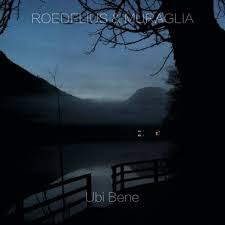While Hans Joachim Roedelius has an extensive and often irreproachable back catalogue of solo work recorded over the last five decades, it is perhaps his contribution to the steady development of electronic music as half of Cluster with the late Dieter Moebius that will be regarded as his longest-lasting legacy. An enthusiastic collaborator with a diverse selection of musicians, the recent electronic album Selective Studies Volume One with Lloyd Cole perhaps being his most surprising pairing, not least for its excellent results.
While Roedelius has probably never released a dud record in his eighty years, some capture the quintessential feeling of ecstatic electronic wonderment that both Cluster and then Harmonia (which brought Michael Rother from NEU! on board to form a trio) defined more than others. In both groups, his was always the airy lyricism to Moebius’ gritty motive power, and Roedelius and Muraglia capture that feeling of almost telepathic partnership on Ubi Bene without falling into the trap of pastiche. Instead it marks a continuation, a new chapter in the still unfolding tale of a remarkable musician whose traumatic experiences in the ruins of the Second World War Europe and later career as a professional masseur led him to make some of the most uplifting and genuinely healing music of the last half-century.
Ubi Bene finds Roedelius serving up a series of glisteningly blissful delights in equally interlocking partnership with the founder of the Kosmische Club, Leon Muraglia, a musician well versed in the lessons of the pioneering German music of the 70s (Krautrock being after all such a silly term). Muraglia’s years as helmsman of motorik-influenced group Radio 9 also stand him in good stead here, drum machine programmes of a decidedly Harmonia variety shuffling out vintage rhythms to provide an anchor for Roedelius’ electronics and instantly-regognisable piano playing.
Likewise, when the delicate piano miniature ‘She Had Always Loved Vienna’ or the wonderfully-titled avant-electronica of ‘There Is A Huge Duck Standing Right Behind You’ provide breathing spaces between the more rhythmic moments, Muraglia switches to sound design mode, glitching and applying texture to the sonorous keyboard playing or synthesiser extrapolations of the maestro. This is Ubi Bene‘s defining aspect, as the interplay of the doyen of beautiful music with a deeply humanist heart meets the machinations of a profoundly knowledgeable acolyte, and together they make the album shine.


